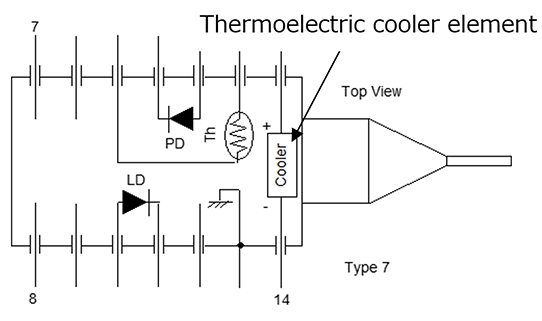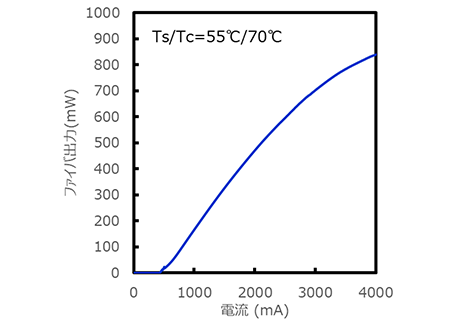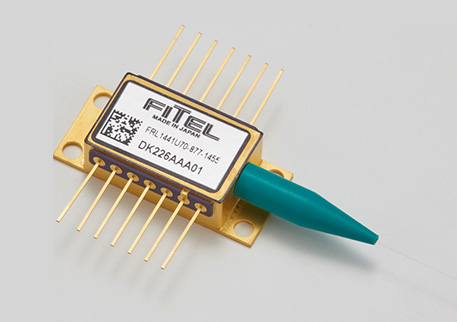FRL1441U Series – pump lasers for Raman amplifiers achieved ultra-low power consumption at 500mW output
- Realization of an ultra-low power consumption LD chip will greatly contribute to reducing environmental impact -
- Confirmed the laser diode (LD) chip in the C band can output 840mW at 55℃
- Reduced reactive power by more than half at 500mW fiber output
- Will start development of mass production technology for laser chips capable of 500mW fiber output when consuming less than 5W
Furukawa Electric Co., Ltd. (Head office: 2-6-4 Otemachi, Chiyoda-ku, Tokyo; President: Hideya Moridaira) successfully operated the FRL1441U Series pump lasers for high output, low power consumption Raman amplifier in the C-band at 55℃, and by reducing reactive power by more than 50%, the newly developed LD chip consumed 3.7W at 500mW fiber output, which is less than half the 8W power consumption of existing LD chips. In addition, we have started development of mass production technology.
Background
While communication traffic volume at data centers and elsewhere has been increasing on the background of the popularization of cloud service and the emergence of generative AI, along with increasing data transmission speed, the transmission distance decreased due to degradation of the OSNR(note 1) on the signal receiving side. In particular, when existing communication systems are used at faster transmission speeds, the role of the Raman amplifier, which can amplify optical output power without attenuation of the signal light quality, will become more important. Also, because the bandwidth of the signal expands as a result of high-speed transmission, it is necessary to extend the bandwidth in order to enable high volume transmission. Thus, Raman amplifiers need to have high flexibility to amplify the light source at a discretionary range based on the selection of the pump laser wavelength. On the other hand, in addition to the traditional C- and L-bands, with the expansion into the S- and U-bands, the number of pump lasers used increases, so it is even more important for them to have high output power and low power consumption.
For pump lasers, reducing the power consumption of the thermoelectric cooler element leads to reducing overall pump laser power consumption (Fig. 1). When pump lasers are used in hot environments, it is necessary to cool the LD chip, but this increases the power consumption of the thermoelectric cooler element, causing overall pump laser power consumption to rise. Therefore, enabling the LD chip to operate at high temperatures is important for reducing pump laser power consumption.
Details
The FRL1441U Series reduces the power consumption of the pump lasers used for existing Raman amplifiers in the S-, C- and L-bands by 37%. In addition, development of a dual port pump laser makes it possible to reduce the space used by using 1 pump laser instead of the previous 2 units. This time, we achieved 840mW output in the C-band at an LD chip operating temperature of 55℃ by 14 pin butterfly package platform (Fig. 2, 3). This achievement was made by optimizing the LD chip to realize with higher laser output and reduced electrical resistance of the laser element. Also, through large reduction to reactive power by operating the laser element at 55℃, we confirmed that power consumption of the widely used 500mW fiber output LD chip is reduced to 3.7W, which is less than half of the 8W power consumption of existing products. We have started development of mass production technology. This development uses our optical semiconductor processing technology using InP(note 2) semiconductor materials developed over more than 25 years and high accuracy fiber coupling technology, as well as the application of our unique low loss, high efficiency semiconductor laser device structure. It also takes advantage of the optimized design of our patented high efficiency semiconductor laser device structure.(note 3)
An oral presentation of this product will be made on July 2 at OECC 2024 to be held in Melbourne, Australia in July of this year.
The current development was conducted and achieved as part of the National Institute of Information and Communications Technology (NICT) commissioned research “Beyond 5G – Development of extended rate optical node technology for realizing ultra-high speed, large volume networks” (Key Issue JPJ012368C04501) and the 2024 Function Realization and International Joint R&D Program “Innovative ICT Fund Projects for Beyond 5G/6G” (JPJ012368G60101).
Going forward, we will continue to develop high output, low power consumption laser chips, and contribute to accelerated reductions in module power consumption and the establishment of environmentally-friendly networks.

(note 1)OSNR (Optical Signal to Noise Ratio): Parameter that indicates the signal-to-noise ratio
(note 2)InP (Indium Phosphide): A III-V compound semiconductor that is used for the manufacture of laser diode chips and high speed transistors
(note 3)US patent US 9,083,150 B2
Related news releases
Furukawa Electric Group’s efforts towards the SDGs
Based on the “Sustainable Development Goals (SDGs)” adopted by the United Nations, Furukawa Electric Group has formulated the “Furukawa Electric Group Vision 2030” which sets the year 2030 as its target and is advancing efforts with the aim to “Build a sustainable world and make people’s life safe, peaceful and rewarding, Furukawa Electric Group will create solutions for the new generation of global infrastructure combining information, energy and mobility.” Toward the achievement of our Vision 2030, we will take open, agile, and innovative approaches to promote ESG management that aims to increase corporate value over the medium to long term and will contribute to the achievement of the SDGs.









 Share
Share Tweet
Tweet Share
Share